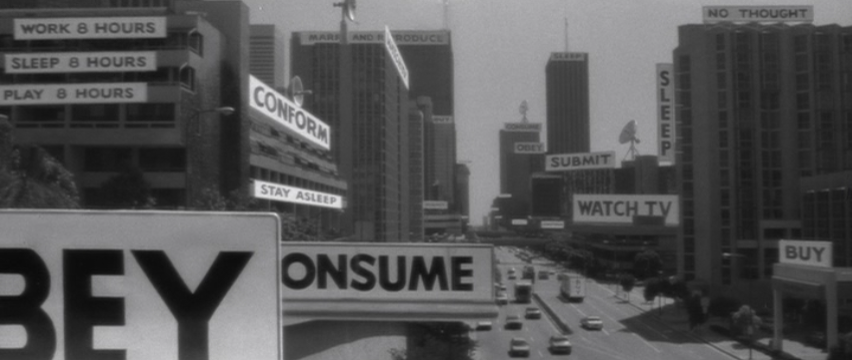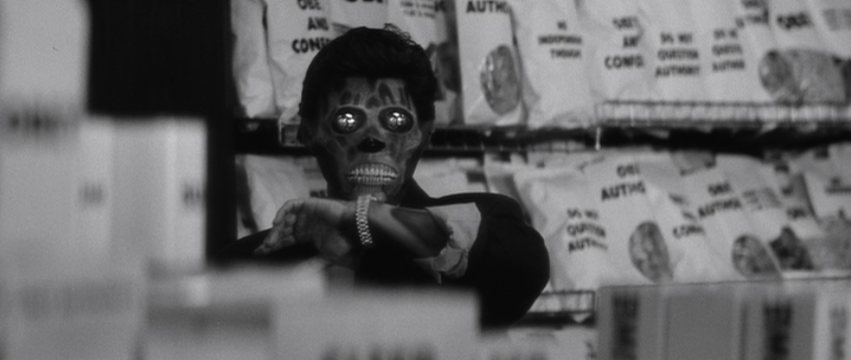You’re a drifter — down on your luck, roaming from town to town with a bedroll and a tool chest strapped to your back. Everywhere around you, other people seem to be getting the breaks — although, admittedly, many more seem to be just as up against it as you are. You find a job as a scab laborer on a construction site, and a squatter’s village that at least offers a hot meal and a place to sleep. Despite all this, you don’t let it get you down. You still believe firmly in the lessons you learned as a kid: that the world is fundamentally a fair place, that people will treat you well if you treat them well, and that working hard and playing by the rules will one day get you to a place of comfort and security; maybe not the mansion on the hill, but not the squatter’s camp either. America still works, you tell yourself, and that gives you the strength to pick yourself up and keep trying.
Then one day you put on a pair of sunglasses and see things you never saw before, and your world goes to shit.
John Carpenter’s They Live looked unflinchingly at the underside of Ronald Reagan’s Morning in America. While Gordon Gekko was rhapsodizing about the goodness of greed, migrant worker George Nada trawled through a stunted shadow economy that grew like a fungus on America’s underbelly. They Live presents an America that seems decent enough to justify George’s faith: the squatters’ camp where he finds shelter runs on compassion and good old American hard work, a true expression of the generosity we hold as one of our core values. The problem, as it turns out, is the ultimate viper in the garden: the elite feeding on America’s underclass are actually aliens in human form, hopscotching rapaciously across the galaxy like a cross between Gordon Gekko and Galactus. Even more heartbreaking is when George discovers why he was able to maintain his faith in the American dream while it fell apart around him. The aliens have submerged the culture in subliminal messages, with every surface blaring a mute clarion of stasis and conformity. Thanks to a pair of sunglasses invented by the revolutionaries fighting the aliens, George walks through L.A. and finally sees, in literal black and white, the new guiding principles of America. SLEEP 8 HOURS A DAY. MARRY AND REPRODUCE. WATCH T.V. STAY ASLEEP. CONFORM. OBEY.

What makes They Live resonate so much for me, a decade after I first saw it and well after it was first released, is what it reveals about paranoia and the comforts of conspiracy. While the film bears the trappings of a sci-fi-based horror movie, its central conceit — that American society is being undermined by alien invaders — is actually more comforting than frightening, because it supports the premise that people are too fundamentally decent to create the kind of society depicted in They Live. Suddenly, we didn’t do it — it was done to us. This preserves our ideas of our own goodness while offering a tantalizing promise of redemption. An alien menace is a menace that can be fought and destroyed; what came from outside can be sent back outside. Sure, defeating a technologically advanced alien race is not going to be a walk in the park. But if there’s one thing we know how to do as humans, it’s kill those who are different from us. Whether the solution proved to be sunglasses, computer viruses or red anti-alien virus powder, we’d find a way. If, however, the problem turns out to be us — if we, not alien invaders, made the world around us, with all its greed and its waste and its callousness — then we’re probably screwed. Continue reading
